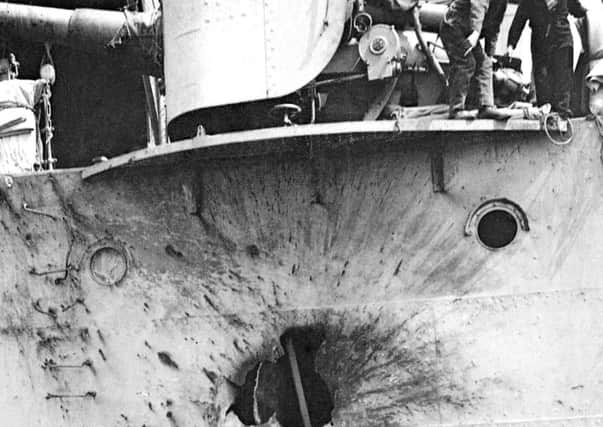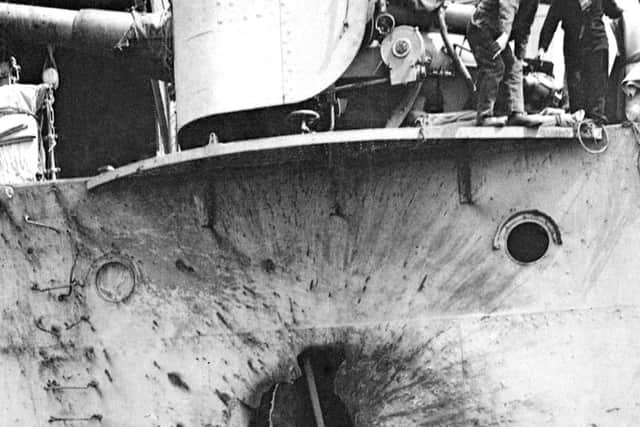Battle of Jutland: Who ruled the waves during the First World War?


“The spell of Trafalgar has been broken.” So crowed Kaiser Wilhelm after the Battle of Jutland in 1916.
However, the reality of the situation didn’t match his hubris. For even though the British lost more ships and men, the Royal Navy had effectively won a victory, albeit a costly one.
Advertisement
Hide AdAdvertisement
Hide AdThe battle between the British Grand Fleet and the German High Seas Fleet brought together the world’s two most powerful naval forces just off Denmark’s Jutland peninsula.


It was the biggest naval conflict of the First World War involving more than 100,000 men, including 280 sailors from across Yorkshire, and 250 ships (151 British and 99 German).
The fighting raged for 36 long, brutal hours on May 31 and into June 1, and by the time it had finished 14 British ships and 11 German vessels were lost.
Both sides called the Battle of Jutland a victory even though the Germans failed to break the North Sea blockade and the British suffered higher casualties.
Advertisement
Hide AdAdvertisement
Hide AdBy the time hostilities were over more than 6,000 British and 2,500 Germans were dead. Among the victims was a 16 year-old lad called Jack Cornwell, later known as “Jutland Jack.”


A teenager gunner in the Royal Navy he became the youngest ever recipient of the Victoria Cross. He had joined the navy when he was just 15 and six weeks later found himself in the thick of the action at Jutland.
His ship, HMS Chester, was hit 18 times by German shells, four of which landed near Jack’s gun. The attacks killed all but two of the gun’s crew and left Jack severely wounded.
Despite his injuries he stayed at his gun awaiting orders, until his ship withdrew from the battle. He was taken for treatment but there was little the ship’s surgeons or hospital doctors could do, and he died on June 2, before his mother Lily could reach his bedside.
Advertisement
Hide AdAdvertisement
Hide AdHis is the best known of all the stories from what proved to be the only major naval battle of the Great War, and a century on he is among those remembered in commemorative events being held around the country.
The Battle of Jutland is often overshadowed by events on the Western Front, but Nigel McCulloch, Royal British Legion’s Head of Remembrance, says it was a key moment of the war.
“In historical terms it was the last big naval battle and although the Germans tried to claim it as a victory it wasn’t. For the Germans to have won they needed to put down the British Fleet and they didn’t achieve that. It was a stalemate.”
It was the last time the Germans challenged the British Grand Fleet, but crucially it also meant that Britain could continue sending troops and supplies to Europe until the end of the war.
Advertisement
Hide AdAdvertisement
Hide AdEven so, it was widely viewed by the public as a defeat and less than a week later the British war effort suffered another major blow when HMS Hampshire sank with the loss of 737 lives after hitting a German mine west of Orkney.
Among the dead was Lord Kitchener, Britain’s secretary of state for war whose famous rallying cry “Your Country Needs You” had adorned army recruitment posters up and down the country.
Despite the criticism subsequently aimed at Britain’s high command - particularly the Admiral of the British Fleet, Lord Jellicoe, who was accused of being over-cautious - McCulloch points to the courage of the ordinary sailors involved.
“They made a big sacrifice because when a ship went down you lost almost a thousand people in one go. That’s the enormity of it. These lads were fathers and sons who left behind families, so it had a huge impact,” he says.
“And it’s important we remember that although Jutland was ultimately a victory, it came at a very high price.”